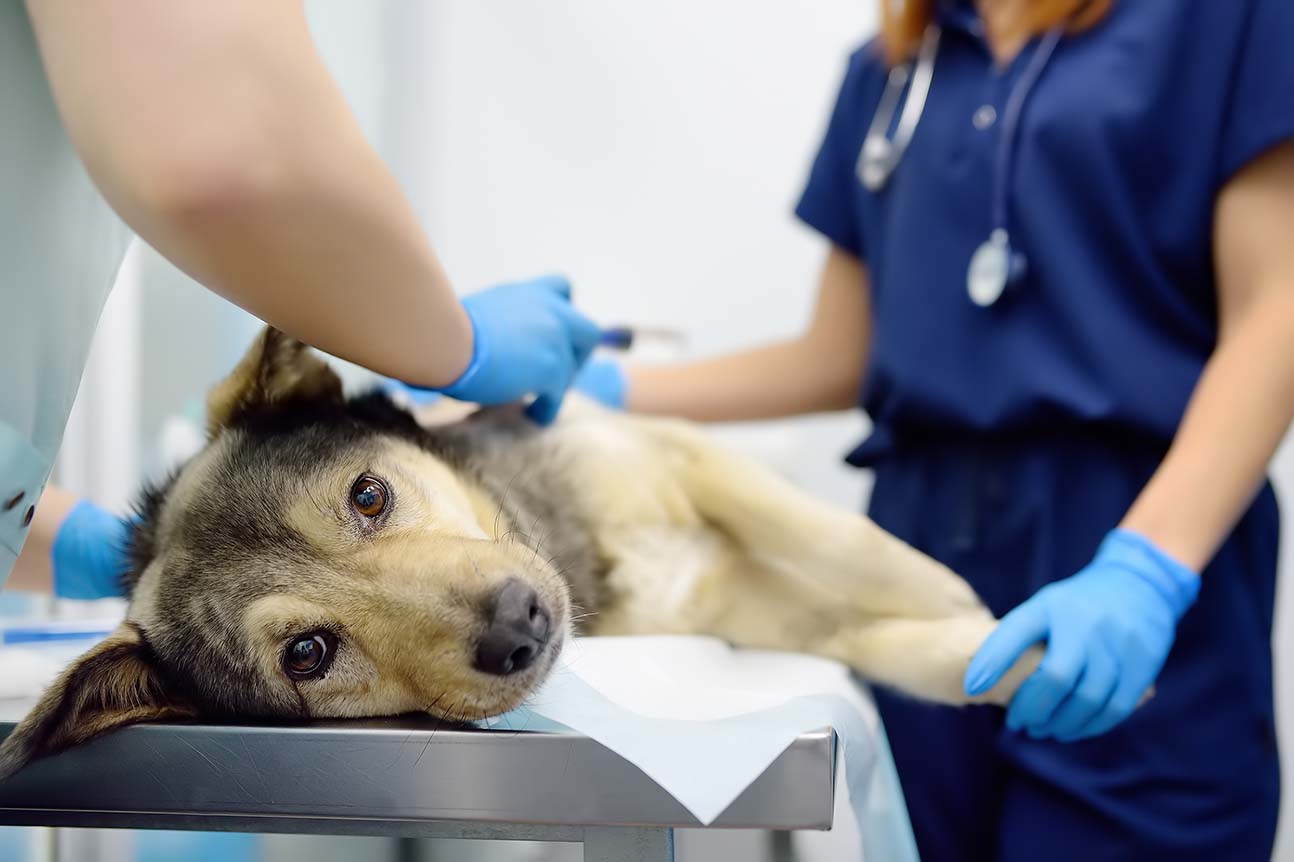Reviewed by Dr. Sarah Yosry
Updated on 22/04/2025
Reading time 4 min.
Overview
Severity: Low
Life stage: All
Liver disease in a dog is a condition that can affect your pet’s overall health. The liver plays a vital role in many functions of the body, such as detoxifying, digesting, and storing nutrients. When the liver becomes impaired, a dog’s health can very quickly deteriorate. It is important to recognize signs of liver disease and get your pet as soon as possible to a veterinary clinic for care.
Whether you are looking for a pet clinic near you, a professional pet clinic, or a well-equipped veterinary clinic in Dubai, understanding what to check can guarantee your dog receives the care they deserve. Through this extensive guide, we will discuss the signs, causes, diagnosis, treatment, and prevention of liver disease in canines. We will also answer some common questions as well as feature a reputable veterinary hospital in Dubai.
What is Liver Disease in Dogs?
Disease of the liver in a dog is any condition that compromises the structure or function of the liver. It may be acute, with sudden onset, or chronic, occurring over a long period. The liver has a very important function in metabolism, clotting of the blood, filtering toxins out of the blood, as well as the production of bile for digestion.
When the liver fails to function normally, toxins enter the bloodstream, functions in the digestive system are impaired, and the body has trouble regulating internal equilibrium. Infections, toxins, hereditary factors, cancer, as well as other autoimmune disorders, are causes of liver disease. Early diagnosis and treatment can avert complications as well as save your pet’s life.
Common Signs of Liver Disease in Dogs
Early detection of signs of liver disease can be a key to a good outcome for your dog. The signs can be variable depending on the cause of, as well as the severity of, the liver dysfunction, but several of the most frequent signs include:
1. Jaundice (Yellow Skin, Eyes, and Gums)
Jaundice is perhaps the most characteristic sign of liver disease. It happens because the liver fails to efficiently process a yellow pigment called bilirubin. Yellow coloration develops on your dog’s eyes, gums, or skin—particularly at the ears and beneath the tongue.
2. Loss of Appetite
Appetite loss, either sudden or gradual, is a typical sign of liver disease. The liver is responsible for helping with digestion, so if it’s not functioning well, your dog may not be hungry. Loss of appetite can also be a cause of weight loss as well as nutrient deficiencies.
3. Diarrhea & Vom
Digestive problems are prevalent in liver disease. Diarrhea and vomiting result because the liver can no longer metabolize toxins properly or control the production of bile. They are sometimes mild, other times quite severe, and occur intermittently.
4. Lethargy or Depression
If your dog becomes less energetic, withdrawn, or sleeps a lot more than normal, this may be a sign of liver disease. The fact that the liver plays such a key role in energy metabolism means that liver disease can cause drastic energy declines as well as shifts in mood.
5. Increased thirst and urination
Dogs with liver disease are normally prone to having a greater thirst (polydipsia) as well as urination (polyuria). This may be a result of liver dysfunction impacting the kidneys as well as the body’s efforts to eliminate toxins in the form of urination.
6. Abdominal Distension or Pain
Fluid accumulation in the body (ascites) or a swollen liver can cause your dog’s midsection to be swollen. Your dog can also be uncomfortable lying down or putting pressure on their midsection.
7. Neurological Symptoms (Hepatic Encephalopathy)
Advanced disease can result in toxins reaching the brain, where they cause a condition known as hepatic encephalopathy. Symptoms can be a variety of things, such as changes in behavior, head pressing, seizures, circling, disorientation, or confusion.
8. Sudden, unintentional loss
If your dog is otherwise eating normally yet losing weight, or if a decrease in body weight is accompanied by other symptoms, liver disease may be the cause. The liver plays a central role in metabolising and storing nutrients.
Causes of Liver Disease in Dogs
Canine liver disease can be caused by a variety of factors. The most common are:
• Infections: Bacterial, viral, or parasitic (for example, leptospirosis) infections may cause liver tissue
• Toxins: Consumption of poisonous substances such as certain plants, drugs, or household chemicals can cause extensive liver damage.
• Congenital Disorders: Various breeds are born with liver disorders, like portosystemic shunts, which disrupt blood flow to the liver.
• Cancer: Both benign and malignant tumors can affect liver function.
• Autoimmune Disease: The immune system attacks the liver cells in certain instances, leading to chronic inflammation.
• Diet: A poor diet, obesity, or consumption of high-fat foods may strain the liver.
If you think your dog is at risk or displaying symptoms, see a certified vet Dubai or veterinary clinic Dubai for a full checkup.
Diagnosing Liver Disease in Dogs
A correct diagnosis is important for successful treatment. Your veterinarian can suggest a variety of tests to diagnose liver disease:
• Blood Tests: Test for liver enzymes, bilirubin, and coagulation.
• Urinalysis: Helps detect protein loss and kidney involvement.
• The imaging: Ultrasonography or X-rays may detect liver enlargement, tumors, or accumulation of water.
• Liver Biopsy: A biopsy may be required in certain situations to assess the cause and degree of liver damage.
Consult a reputable vet clinic in Dubai or look for a veterinary clinic nearby that provides your pet with timely and correct diagnosis.
Treatment Options for Liver Disease
The treatment is based on the cause and extent of the liver disease. Treatment methods commonly used are:
• Medication: Antibiotics for infection, anti-inflammatories, and drugs to lower the level of bile acids or guard liver cells.
• Dietary Management: Low-protein, low-copper diets are commonly recommended to minimize liver stress.
• Supplements: Supplements of liver support such as SAM-e, milk thistle, and vitamin E.
• IV fluids: for hydration and removal of toxins.
• Surgery: It may be needed to eliminate tumors or repair congenital defects.
A customized treatment program by a veterinarian local to my area or animal clinic can greatly enhance your dog’s outlook.
Preventing Liver Disease in Dogs
Although not all liver disease is preventable, you are able to decrease your dog’s risk by doing the following:
• Avoid Contact with Toxins: Store medications, antifreeze, certain foods, and poisonous plants out of reach.
• Fed a balanced diet: Give your pet high-quality dog food that is suitable to their needs.
• Sustain Healthy Weight: The liver can be stressed by obesity. Engage your dog in exercise and keep them at a healthy weight.
• Routine check-ups: Get regular appointments at your veterinarian clinic to detect liver problems at their initial stages.
• Vaccinations: Get your dog vaccinated for diseases such as leptospirosis that target the liver
Conclusion: Give Your Dog the Best Possible Care
Your dog’s well-being and good health depend on you. Liver disease can be serious, however, and by receiving the proper care with timely intervention, most can recover or successfully manage the disease.
If you are based in Dubai and need professional veterinary services, think of us as your pet care provider. Modern Vet clinic in Dubai has made a name for itself in terms of superior diagnostic skills, treatment, and empathy. As a premier veterinary clinic, we provide sophisticated facilities and experienced staff who can ensure your pet’s rapid recovery.
Go to bookme.modernvet.com to set up an appointment or find out more about our extensive pet care services. Your pet deserves the very best, and Modern Vet can deliver.
Share this, choose your platform!
Writen by
Dr.Sarah Yosry
DVM
A product of a rich Australian/Egyptian heritage, Dr. Sarah Yosry stands as a testament to the union of diverse cultures and a shared love for animals.



